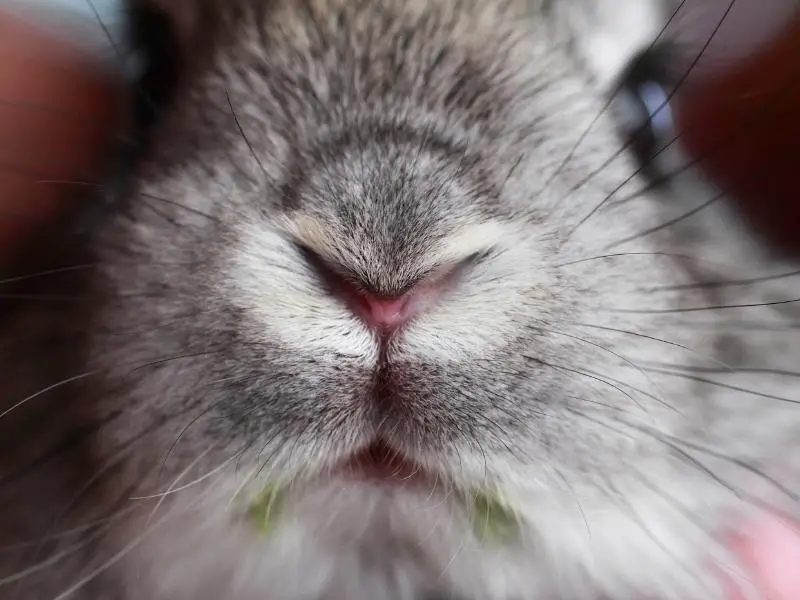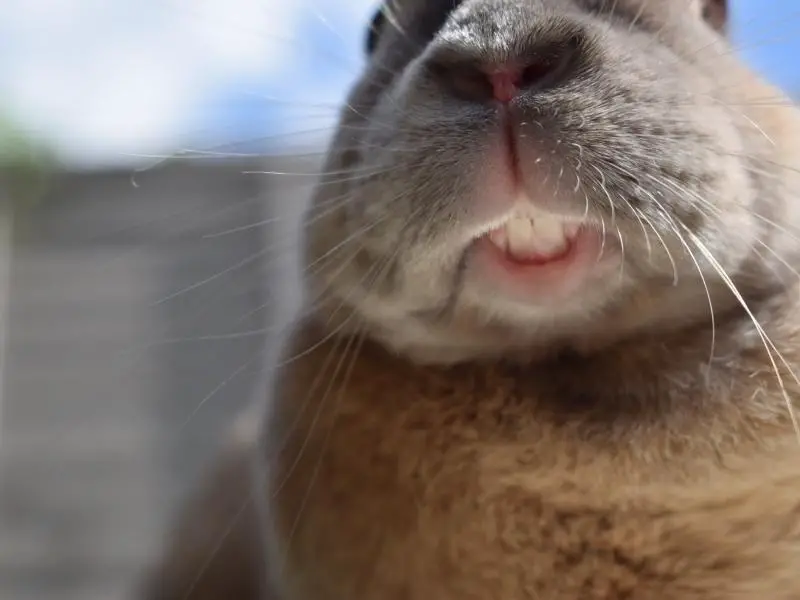Rabies strikes fear in the heart of any person, and it’s possibly even worse if you wonder whether your furry pet can get rabies. You may be in this boat now – wondering if rabbits can have rabies. So can they?
Rabbits can get infected with rabies if they’ve been bitten by a rabid animal (usually a wild predator). Rabies is a viral disease that’s usually fatal for rabbits (and all animals). The incubation period is 2-3 weeks, and from the onset of symptoms, the infected rabbit dies within 3-4 days.
Want to learn more about rabbits and rabies? We’ve got everything you ever needed (and wanted) to know with this comprehensive guide.
What Are Rabies?
Rabies is an infectious disease caused by the Lyssaviruses. This disease affects an animal’s or human’s central nervous system, and as a result, the infected behaves abnormally.
Rabies is preventable, and if not detected early enough to be treated, the infected animal or person dies.
According to the Centers for Disease Control and Prevention (CDC), the majority of reported cases of rabies every year occur in wild animals – foxes, bats, raccoons, and skunks.
What Causes Rabies in Rabbits and How Is Rabies Transmitted?
Any mammal can get infected with rabies, so that includes you, wild rabbits, your pet bunny, dogs, and cats. An infected animal is considered to be rabid.
Rabies is caused by a group of viruses (Lyssaviruses) of the Rhabdovirus family that is transmitted when:
- An infected animal bites another animal
- An uninfected person or animal comes into contact with infected saliva, which spreads the virus via mucous membranes
- An animal has an open wound and comes into contact with a rabid animal that then licks the wound
The CDC states that rabbits have a low risk for contracting rabies when compared to other animals like cats, dogs, skunks, raccoons, and ferrets. However, that isn’t to say a low risk is a no risk.
You may wonder why it is that rabbits have a lower risk of getting rabies. It’s because there’s little chance that a rabbit survives an attack from a larger predator that’s infected with rabies.
As such, the rabbit will most likely succumb to their injuries before they have a chance of biting or infecting other animals.
Rabies Symptoms in Rabbits

The symptoms of rabies aren’t the same for every animal that gets infected.
You may see that the rabbit has visible bite wounds, but that may not always be the case as the wounds – depending on severity – may have healed before the rabies symptoms appear.
If a rabbit is infected with rabies, the incubation period is generally 2-3 weeks. From the onset of the symptoms, a rabbit dies quickly – usually in 3-4 days.
Within the incubation period, you won’t know that a rabbit is rabid unless laboratory tests are performed.
Here are the typical symptoms a rabid rabbit may have:
- Behavior changes, like acting aggressive and violent when the rabbit is normally sweet-natured, or the rabbit becomes reclusive
- Lethargy
- Light sensitivity
- Restlessness and agitation
- Seizures
- Head tremors
- Fever
- Ascending paralysis
- Excessive salivating
- Dropping their jaw
- Difficulty swallowing and chewing
- Head tilt
- Weakness
- Nasal discharge
- Teeth grinding
- Poor muscle and limb coordination
Can Rabbits Recover From Rabies?
It’s highly unlikely that a rabbit will recover from rabies infection. The chances of recovery increase if the infection is caught early – in the incubation stages – and the rabbit is treated. However, there are no formal treatments for rabies.
If the rabbit survives, it’d need to be quarantined for 6 months or longer to make sure the bun isn’t rabid any longer.
In most cases, rabbits are euthanized to prevent the spread of the rabies virus. It is the humane way to handle the situation and it’s best for public safety reasons too.
Can Pet Rabbits Have Rabies?
Pet rabbits can get rabies, even though it is relatively rare.
In recent years, cats are the domestic animals that most commonly contract rabies, so if a pet rabbit is bitten by a rabid cat, the bun can get rabies.
The same goes for a pet bunny that has contact with any other rabid animal – whether a:
- pet dog, ferret, hamster, guinea pig, or mice
- wild animals like a rat, raccoons, coyotes, wild rabbits, or hares
How to Protect Your Pet Rabbit From Rabies
Since there is no cure for rabies, it’s best to take preventative measures to ensure your pet rabbit doesn’t get infected with rabies.
Unfortunately, there is no rabies vaccine for rabbits; however, if you have a dog, cat, ferret, horse, cattle, or sheep, get your animals vaccinated to protect them from contracting rabies.
So how exactly can you protect your pet rabbit from rabies?
- Keep your bun inside to protect them from exposure to rabid animals.
- When your bun explores your garden or plays outside, supervise your bunny. Wild animals are less likely to enter your property when you are around.
- Ensure your garden is unattractive for wild predators – contain your trash and ensure there’s no pet food or other temptations lying about.
- If your rabbit stays outside, ensure the rabbit hutch is predator-proof so no wild animal can get close to your bun.
- Contact local animal control if a rabid animal has found their way onto your property and died there.
- Report any animal bites to your local animal control.
- Don’t come into contact with wild animals or strays. This also means don’t adopt stray animals – you never know what diseases they carry and what you are exposing yourself and your other pet animals too.
- If a bat has been hanging around your property, use bleach to clean bat droppings. And thoroughly wash the area with soap and bleach to decontaminate it.
My Last Bunny Thoughts
Rabies is a serious and fatal disease, and not something you’d want your beloved bunny bestie to ever contract. The chances of your rabbit being okay after exposure are slim to none.
Prevention is the best cure for rabies since there is no formal treatment, no cure, and no vaccine for your rabbit.

